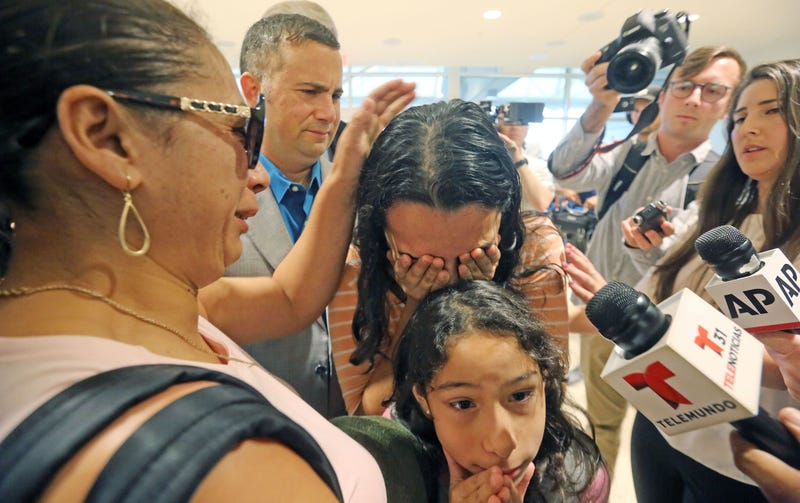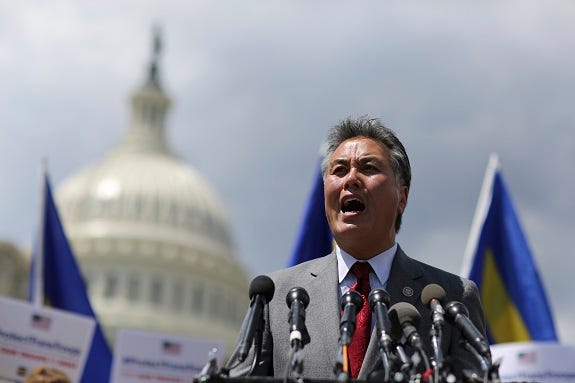
16-year-old Pamela Juarez has felt a “deep hole” in her heart ever since she watched her mother, Alejandra, being deported to Mexico along with her sister, 9-year-old Estela last August. Her mom and dad, a Marine Corps veteran have been married for almost 18-years, but that didn’t stop immigration authorities from forcibly moving her mother from the United States, despite no criminal record.
Now, there’s a bipartisan push to address the issue of deporting military spouses and family members.
RELATED: Military spouse deported to Mexico 20 years after entering U.S.illegally
The Protect Patriot Spouses Act, filed Tuesday by Rep. Darren Soto (R-Fla.), who represents the Juarez’s district, would make military spouses eligible for adjustment status, a process that can end in permanent resident status (also known as a Green Card).
The bill would change current law, and allow military spouses who entered the country illegally to pursue citizenship. Where it stands now, they must leave the country before that process can be started.
“When Alejandro Juarez came to the United States, she started a family and fell in love and got married and had two wonderful daughters, Pamela and Estela,” Soto said Wednesday at an event unveiling the legislation.
“When she faced a deportation order, until the end, she never gave up.”
RELATED: Deported veteran returns to the U.S. to become citizen
“Our family hasn’t been the same since we were forced apart from Trump’s immigration policies,” said Pamela. “By sending her away, they didn’t just scare my mom and my sister for life, they also punished a Marine veteran, which I find horrible. Why would this country want to do that to someone who fought for this country?”
Immigration authorities were notified about Alejandra’s undocumented status during a routine traffic stop; she has no criminal record. Her case was not a priority for deportation until the Trump administration implemented a “zero-tolerance” policy of criminally prosecuting all illegal entries.
The issue, according to Marine Corps and Iraq war veteran Rep. Ruben Gallego (D-Ariz.), is a lack of leeway authorities have in the current immigration system.

“The idea that we are deporting military spouses, I think, is just horrendous,” said Gallego. It isn’t that military spouses are targeted, “it’s just that we have this policy that this president has instituted that does not allow for discretion.”
House Veterans Affairs chairman Mark Takano (D-Calif.) said that veterans “willingly put themselves in harm’s way and their families, but for thousands of service members facing deportation or for young families like Pamela who watch as their parent is deported, it has been an emotional and heartbreaking shock.”
Around 350,000 Americans are married to people born in another country, and up to 11,800 US service members have a loved one who is facing deportation, according to American Families United.
The issue of deportation is also prevalent with veterans who find themselves on the wrong side of the law and are punished by being forced to leave “the only country that they know, and the country they fought for,” said Takano.
RELATED: Former Paratrooper travels to the Caribbean to fight for deported US veterans
Some veterans deported to Mexico find their way to The Deported Veteran Support House in Tijuana, also known as the bunker. Takano said he’s met with deported vets now living there who are feeling the consequences of a “broken” immigration system that is in “dire need of fixing.”

That doesn’t mean deported veterans can never return to the US, but more often than not, they come back in caskets to be buried in full military honors after they’ve died.
“It is deeply unfair for families to have to suffer, to be kept away from each other, separated by borders because of an immigration system that no longer works,” added Takano.
Congress and the Government Accountability Office (GAO) will release a report requested years ago on deported veterans. The report, Takano said, will shed important light on the issue of deported vets and tohelp come up with possible legislative solutions.
